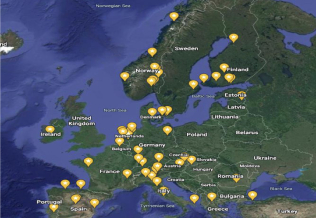PEDs can be a game-changer
Positive energy districts and neighbourhoods are an attractive approach to change the ways that energy is produced, distributed and consumed. They can become a key instrument for cities to achieve decarbonisation goals.
Effective changes to energy systems require technical and economic knowledge as well as input from the energy system stakeholders who are part of these systems. The TRANS-PED project has developed critical input for a collaborative approach for public, private, and third sector organisations to identify challenges and develop solutions to realise significant changes in urban energy systems.
PEDs involved in the project
Abattoir
Belgium
The Brussels living lab of sustainability where business, living, leisure & education meet fueled by renewable energy, rainwater harvesting & human connection.
Brunnshög
Sweden
Realizing a more sustainable future – the district in Lund aims to become a world-leading environment for life, innovation, and research.
Hammarby Sjöstad 2.0
Sweden
Demo site and test bed for innovation in energy, transport, circular economy, digitalization, and urban farming located in the city of Stockholm.
Reininghaus
Austria
Currently under construction, it is an energy self-sufficient and CO2-neutral city district being developed on the area of a former brewery.
Sonnendorf
Austria
Based in Austria’s Tyrol region, it is a highly innovative development to pioneer affordable and sustainable housing in rural areas.
PED projects in Europe
JPI Urban Europe compiled more than 60 PED projects from across Europe in a comprehensive report, detailing the status of each project. (not part of the project)





